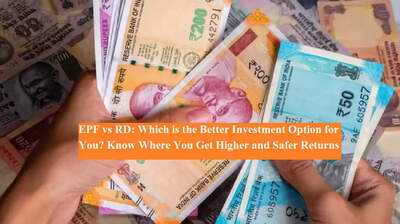Every investor wants two things — safety of money and good returns. When it comes to reliable savings options, Employee Provident Fund (EPF) and Recurring Deposit (RD) are among the most preferred choices. Both are safe, but they serve different purposes. Let’s understand which one suits you better.
This contribution gradually builds a large retirement corpus over time. The government declares an interest rate every year — for FY 2024–25, it stands at 8.25%, one of the highest among safe savings options.The best part? EPF returns are completely tax-free, and your entire investment is protected under government regulation. Thus, EPF is an ideal tool for long-term financial security and retirement planning.
🔹 RD: Flexible Monthly Savings with Fixed ReturnsOn the other hand, Recurring Deposit (RD) is a short-to-medium term saving scheme offered by banks and post offices. You can invest a fixed amount monthly, and upon maturity, you receive your principal plus interest.
RD interest rates generally range between 6% to 7.5%, depending on the bank and tenure. It’s a great choice for people who wish to save gradually for small financial goals like a vacation, emergency fund, or gadget purchase.
However, unlike EPF, the interest earned on RD is taxable under your income tax slab. Banks also deduct TDS (Tax Deducted at Source) if your interest exceeds the exempt limit.
🔹 Tax Benefits and Withdrawal RulesEPF offers double benefits — tax saving and tax-free maturity.
You can claim deductions under Section 80C for your EPF contributions, and if you remain invested for at least five years, the entire maturity amount (including interest) remains tax-free.
On the other hand, RD does not provide tax benefits. The interest earned is added to your annual income and taxed as per your slab rate.
In terms of withdrawal, EPF funds cannot be withdrawn freely — they can be accessed only in specific situations such as medical emergencies, home purchase, or after retirement. RD, however, offers partial withdrawal or premature closure, though penalties may apply.
🔹 Which One Should You Choose?If you’re looking for long-term, risk-free savings and want to build a retirement corpus, then EPF is the clear winner. It provides high returns with full security and tax exemption.
However, if you prefer flexibility and short-term goals, an RD might suit you better. You can start small, invest consistently, and achieve medium-term financial targets without locking your funds for decades.
👉 Final Verdict:
For salaried individuals — EPF is the smarter, safer, and more rewarding investment.
For self-employed or short-term savers — RD offers convenience and liquidity, albeit with taxable returns.
SEO Keywords: EPF vs RD, Best Investment 2025, Tax Free Returns, Safe Investment in India, EPF Interest Rate 2024-25, RD Interest Rate 2025, Long Term vs Short Term Investment
Would you like me to make a headline thumbnail caption + 2-line meta description for this article (for Google News and social sharing)?
You may also like

"Big defeat of Omar Abdullah's ideology": J-K LoP Sunil Sharma on BJP President Sat Sharma's victory in Rajya Sabha election

Maharashtra Tragedy: Satara Doctor Ends Life, Note Accuses Cop Of Rape

Daily Horoscope - October 25, 2025 (For All Zodiac Signs Today)

'Bike dragged under bus': How Andhra fire mishap unfolded; motorcyclist, 19 passengers dead

Japan scrambles jets as Russian bombers fly near its coast







